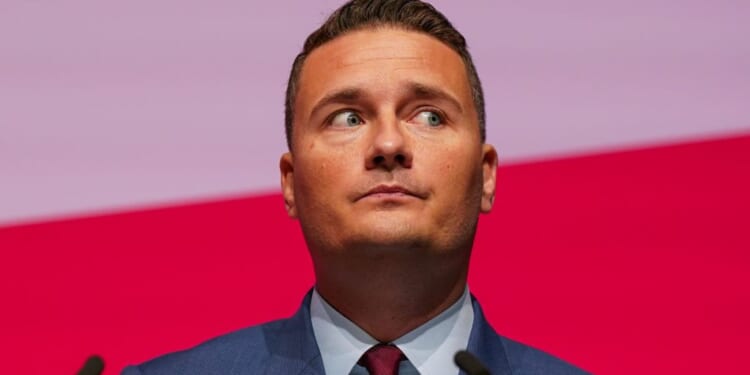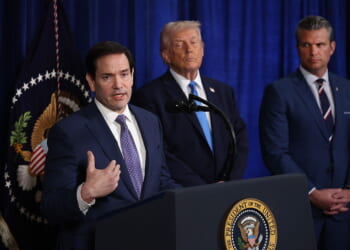How many obituaries of Starmerism can we write? Perhaps not too many more. For even if the Prime Minister survives a painful Budget, the question is now when not if he goes. But Labour’s dwindling number of supporters should not expect much respite — Starmer’s potential replacements barely pass muster. Indeed, it is their very paucity that keeps the flailing premier in place. And even if one of them, whether Wes Streeting or Shabana Mahmood or even Ed Miliband, manages to clinch the keys to No 10, they’ll still face the same problems that have hamstrung Starmer from the start: timidity in policy, and the same geopolitical headwinds that make the party’s technocratic tinkering so ineffective.
Perhaps the most plausible current replacement for Starmer is Streeting — and his stock has clearly risen. On a personal level, he’s surely a more dynamic, believable and telegenic politician than the PM. Where Starmer has no tonal register that doesn’t land as a pained, pre-rehearsed vacuity, the Health Secretary can at least appear sincere, fluent and relatively spontaneous. Nor would Streeting be lumped with Morgan McSweeney and a Downing Street operation that has, according to one exasperated Labour figure I spoke to, “descended into pure paranoid insanity”.
That, of course, still leaves the question of policy. Starmer’s own pitch was always one of quiet professionalism — “a politics that treads lighter on our lives”, as the man himself once put it. After years of Tory psychodrama, an understated seriousness appealed to many, even if it came in lieu of an intellectual hinterland. Such was the implicit bargain after 10,000-word Fabian Society pamphlets and soporific “This is what I believe” essays failed to reveal much about anything. “There’s no such thing as Starmerism and there never will be,” the Prime Minister told colleagues for good measure before taking office. “I will make decisions one after the other.”
And so he has. His leadership has been characterised by a sporadic series of disjointed, scattergun choices, made seemingly ad hoc and without any overarching context. Most policies are announced and then forgotten, lost in the news cycle, or else abandoned after a backlash. Remember winter fuel and disability benefit reform? How about our “island of strangers”, or troops on the ground in Ukraine? Let’s see how digital ID goes.
If Starmer’s myriad failures are ultimately tied to his lack of ideological ballast — his lack of “Starmerism” — then what could we expect from “Streetingism”? As a talisman of the Blairite Right, Streeting would likely pursue a more robust implementation of Tony Blair Institute-style policy points: AI adoption; a streamlined, lean state; welfare reform; an Atlanticist foreign policy; and a full-throttle embrace of Big Tech. But while this agenda may be pursued more consistently and vigorously under the Health Secretary, it doesn’t veer radically from our current path, and is unlikely to deliver us from our secular malaise. Just as New Labour’s Faustian pact with the City left us brutally exposed during the 2008 crisis, TBI Britain would leave us as a European outpost of American interests, over-reliant on the tech asset bubble. What’s more, we’d risk becoming an appendage of Silicon Valley, still beholden to trade and capital flows in a rapidly deglobalising world, with an emaciated state apparatus and growth concentrated in sectors with few employment prospects and low economic multipliers.
There are alternatives. The favoured replacement candidate of the Blue Labour tendency is Home Secretary Shabana Mahmood, who has wooed some with her hardline stance on migration and crime. This week, she called for the emulation of Danish policies on refugees and asylum. Yet this same social conservatism risks repelling Labour members, as well as many MPs. Her speaking style is tepid and overwrought. Whether she can make the transition to a leader for a populist age, one that demands a challenging mix of emollience and pugnacity, along with an easy, authentic patter, is unknown. And for all the emphasis on her “Blue Labour” credentials, that second word in the duo risks becoming obscured. While she is comfortable talking tough on crime, it remains to be seen whether she makes the grand arguments needed for a restoration of national industry, of domestic production, of a strong, protective state.
It’s telling, perhaps, that it’s been left to a non-parliamentarian, Andy Burnham, to spell out the most obvious departure from Starmerite political economy. The Mayor’s putative, alternative vision of “Manchesterism” — centred around publicly owned utilities and mass social housebuilding — will attract the Labour rank and file. But Burnham has no Commons seat, and is therefore ineligible for the leadership. A re-energised Ed Miliband has been touted as an alternative talisman for the mushy soft-Left, and he would likely run in this vein too. His Net Zero and progressive credentials would allow him to run as an unashamed anti-Reform leader, looking to unite Labour, Liberal Democrat, centrist Tories and Green voters in a “Stop Farage” alliance.
Meanwhile, given that the Labour brand among voters attracted to the anti-systemic iconoclasm of the populist Right may be irrevocably damaged no matter who is leader, uniting the Left and centre in a broad coalition probably makes sense in electoral terms. Even reviving the complacent, liberal-metropolitan spirit of London 2012 would represent an improvement on Starmerism’s cautious and self-defeating desire to appear as all things to all men, alienating more or less everyone in the process. And with Starmer’s personal ratings lower than any prime minister in history, any alternative would likely lead to a significant, if temporary, polling bounce. That’s hardly surprising: the small circle of Labourites currently running the shop have confused what was once an effective electoral plan — “nuking” the Left and hoping for the best — with an actual governing project.
Yet if progressive liberalism with a human face might be the best way to weave the necessary strands into a coherent electoral bloc, the fact is that Labour’s problems run far deeper than mere personnel. To that extent, Starmer is merely the symptom of a far broader failure of imagination: never in the postwar era has Britain been led by a political clique so devoid of a vision or transformative purpose. Notice, here, that I avoided saying faction: that would imply some semblance of a worldview, or a consistently pursued framework for governing, beyond the attainment of power for power’s sake. It would also require the identification of winners and losers, according to a broad scaffold of political morality, and an idea of how the country ought to be.
All the Labour hierarchy’s problems stem from a fundamental misdiagnosis: that the panacea for a two-decade slump in living standards would merely entail a changing of the guard. The truth, of course, is that Britain’s seemingly intractable structural decline could never just be remedied with the adoption of some new, more arid professional management jargon, after years of Cameroon insouciance or Johnsonian bombast, to say nothing of the Truss calamity. And as Labour has realised that administrative competence — which worked so well at the Crown Prosecution Service, or indeed in Parliament circa 1999 — isn’t enough for genuine political leadership, panic has set in.
What is needed in the current climate — a willingness to decisively break with the old — has clearly eluded Starmer and looks set to elude his successor. Mere adults-in-the-room competence has been blown apart by experience. Rather than smooth efficiency, and slow-and-steady reform, we have desperate scrambling, a grim spectacle of ministers in office but not in power, reaching its apogee as the Prime Minister’s team resorted to invoking the bond markets to save his skin, briefing that a leadership election now would spook investors.
“What is needed in the current climate, a willingness to decisively break with the old, has clearly eluded Starmer and looks set to elude his successor.”
This aspect of the abortive Streeting leadership debacle speaks volumes about the state we’re in. Over the last half century, politicians have voluntarily ceded their powers to anonymous, exogenous forces, making themselves supplicants to international courts, to permanent bureaucracies, to arms-length technocratic bodies and, crucially, to international capital, to the bond markets. The fact that Starmer’s allies plead with colleagues that gilt-traders must, above all, be sated, shows us who really runs Britain: and that nobody is willing or able to “Take Back Control”.
Streeting, Mahmood, Miliband, Burnham — each of them would need to pursue a genuinely radical rupture if they wished to overcome the current Prime Minister’s defects. But such ambition, if anathema to Starmer, is quite possibly beyond them too, and indeed beyond anyone currently in the Labour Party. After all, economic and political sovereignty would require us to eliminate our day-to-day deficit dependency, taking on special interest groups still in receipt of permanent, structural — and enormous — cash transfers. But it also requires a massive shift from revenue spending to capital investment and infrastructure, and a desire to reshore, domesticate and discipline highly mobile capital with the kind of statist interventions that we haven’t seen in 50 years of progressive integration into the liberal-globalist empire.
So instead, and especially given the myopic, moribund culture Labour now seems stuck with, we’ll likely see a continuation of managed decline, with the haphazard focus on policy titbits maintained as a hallmark. Morgan McSweeney’s sacrifice on the altar of Starmer’s failings might buy time before the PM’s own demise. But whoever takes over will be faced with the same symptoms of broken Britain: fiscal crises and a restive electorate, coupled with a political economy that has generated near-zero per capita growth in a generation. And if, after all that, a Prime Minister Streeting does somehow manage to inject some verve into Labour, the odds are that his Ilford North seat — majority: 528 — will fall to a “Gaza Independent” at the next election. What a fitting postscript that would be, for a government that’s helped bring us so low.

















